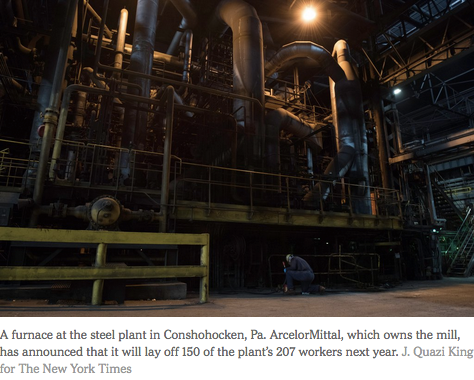CONSHOHOCKEN, Pa. — At this sprawling steel mill on the outskirts of Philadelphia, the workers have one number in mind. Not how many tons of steel roll off the line, or how many hours they work, but where they fall on the plant’s seniority list.
In September, ArcelorMittal, which owns the mill, announced that it would lay off 150 of the plant’s 207 workers next year. While the cuts will start with the most junior employees, they will go so deep that even workers with decades of experience will be cast out.
“I told my son, ‘Christmas is going to be kind of scarce, because Mommy’s going to lose her job soon,’” said Kimberly Allen, a steelworker and single parent who has worked at the plant for more than 22 years. On the seniority list, she’s 72nd.
The layoffs have stunned these steelworkers who, just a year ago, greeted President Trump’s election as a new dawn for their industry. Mr. Trump pledged to build roads and bridges, strengthen “Buy America” provisions, protect factories from unfair imports and revive industry, especially steel.
But after a year in office, Mr. Trump has not enacted these policies. And when it comes to steel, his failure to follow through on a promise has had unintended consequences.
Foreign steel makers have rushed to get their product into the United States before tariffs start. According to the American Iron and Steel Institute, which tracks shipments, steel imports were 19.4 percent higher in the first 10 months of 2017 than in the same period last year.




